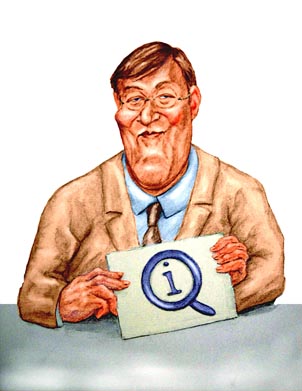Stephen Fry

Stephen Fry is one of the most popular television and film personalities in the UK, and emerged from the Oxbridge comedy tradition which produced the likes of Rowan Atkinson, John Cleese, Terry Jones, and others. Upon graduating from university (the Brits like to leave out "the"), he appeared in a number of British comedy shows like Jeeves and Wooster, Blackadder, and in a very non-Stephen role as Blaster Sump in "Kids Today" in the Thin Blue Line. He became better known to US audiences in a number of appearances in the rather lamentable series Bones, and in the even more lamentable Desolation of Smaug and Battle of the Five Armies, the penultimate and ultimate episodes of what we suppose were intended to be a film treatment of the The Hobbit, but probably should have been titled A Horribly Padded Script with Orcs, Elves, Dwarves, Wolves, and A Little Bit of the Hobbit.
We do not mean, of course, to criticize Stephen's performances, per se. But certainly his acting tour de force was not a comedy. It was the film Wilde where he played (who else?) Oscar Wilde . This movie holds a particular if not unique distinction in that the screen writers strove for accuracy rather than sensationalism. Perhaps for that reason the film was not wildly (no joke intended) successful and remains an all-time CooperToons favorite.
Today, though, Stephen is best known as the host from 2003 to 2016 of the intellectual panel/quiz/comedy show Qi, or in the expanded title Quite Interesting. Each week Stephen asked the panel of British (and the occasional foreign) comedians a series of questions which are so interesting and unusual that no one is expected to get the answer. Instead points are awarded if the answer is interesting and deducted if they are both wrong and obviously so.
Vastly superior to anything - that's anything - currently (or possibly ever) aired on American television, it should strike the US viewer as odd that topics or remarks which would get a host bounced from an American network quicker than you can say politically incorrect are bandied about with such savoir faire and élan on what is a government run broadcast. The main reason, of course, for such freedom of expression is that despite a constitutional guarantee of free speech in the United States, through custom, judicial rulings, and legislation clearly at odds with the Bill of Rights, it is clear that most Americans, regardless of political persuasion, prefer their free speech limited to those who share their own particular views. Fortunately, England, with no specific constitution, has been able to avoid such degeneration of civil liberties. Then there is of course the fact that the English can joke about themselves, something Americans have long forgotten how to do.
Of course, nothing is perfect, not even BBC's Qi and sad to say America's lifeless attempts to imitate British comedy seems to be having an unwholesome influence on the show. Not only has the decibels of the more recent broadcast increased at least an order of magnitude - American comedians tends to think that shouting the lines somehow transforms boring non-jokes into high wit - but Stephen's regular foil Alan Davies - who in the earliest shows inevitably landed in last place - actually started winning!
A bit more worrisome for true Qi fans is that some statements and comments that have been aired are actually incorrect - in actual fact of content, not just politically so. Or at least the answers and discussions might mislead the unwary. So in keeping with the philosophy of Qi, CooperToons has compiled a list of a few of these trifling errors and ambiguities which can be viewed if you just click here.
Although Stephen relinquished the chair, the show is continuing with the able Sandi Toksvig taking the headmaster's job.